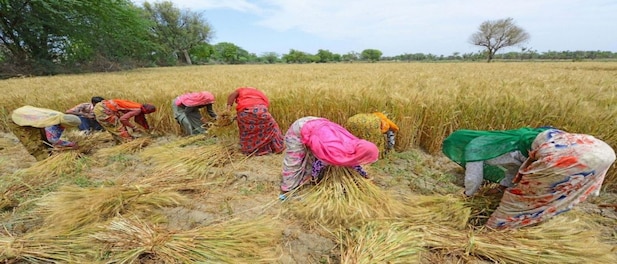Home
Terms and Conditions
Unseasonal rains dim MP wheat farmers prospects; higher MSP fails to narrow losses

Recommended Articles
View All
Reshambai Mewada lives in Chanderi and was threshing the wheat crop with her daughter-in-law Sunita Mewada. She said, "Because of rains and hail, the grain has dried up, so we are not getting a good price. There is a limit to how much the govt will buy from us, the rest we will have to sell at a lower price in the open market. This means huge losses for us."
Another wheat farmer from Chanderi, M S Mewada told CNBC TV-18 that "I was expecting a harvest of over 250 quintals, but this year's produce fell to 120 quintals due to unseasonal rains affecting the filling of the grain. I sold my crop to the government at MSP, bearing losses on the remaining lot."
Also Read: About 1.5 lakh farmers practising natural farming in Himachal to be certified under PK3Y in FY24
Every other farmer had a similar tale to tell. And it's not just Chanderi. After Chanderi, we went to Bhopal's Kannod mandi, one of the biggest mandis in the state. In this mandi, farmers can sell their produce to both government and private traders. The gloomy scene dominated the mandi as well. As the private traders made their bids tractor after tractor, whatever hope the farmers had vanished in thin air.
These farmers told CNBC TV-18 that, "We have to sell at least 5 quintals of our crop at losses in the open market. Due to discolouration, private traders are paying us between Rs 1,300/quintal-Rs 1,800/quintal, depending on the quality. We can sell only 18 quintals to the government.
But the money from the government also comes after three weeks. This is a long period for us as we need the money asap to pay our labourers, start our next harvest cycle, and clear other expenses. That's why we sell to the private traders despite lower rates."
The Food Corporation of India (FCI) started procuring wheat for Rabi Marketing Season 2023-24 in the last week of March. Like last year, this year also, there are multiple aspects to government procurement. Like last year, this year also weather conditions are dominating the procurement trends.
In 2022, the heat wave affected overall production, and heavy exports spiked up the demand. As a result, farmers were getting a much better deal in the open market as compared to the government's procurement.
This time, the unseasonal rains and hail have affected the procurement pattern. Unlike last year, this time, farmers are depending on the FCI procurement. The unseasonal rains, which started in the first week of March, have damaged the wheat crop in all the wheat-producing states.
In Madhya Pradesh, discolouration and shrinking of the grains due to the unseasonal rains have made the produce less attractive to private traders. In states like Punjab and Haryana, the overall quantity has also taken a hit. That's why the farmers are taking their produce to the govt procurement centres.
The increased Minimum Support Price for this year has made FCI a better buyer for the farmers. The government has increased the MSP from Rs 2,015/quintal in 2022-23 to Rs 2,125/quintal in 2023-24, an increase of Rs 110.
But, there are limitations to the relief FCI can bring to the farmers. FCI slashed its procurement target by 22 percent in 2023. Last year, FCI's procurement target was 44 MT, which is now slashed to 34.15 for 2023-24. FCI is procuring 18 quintals/acre.
The government's slashing the procurement target is also making matters worse for them as the farmers feel that due to the cap on procurement, they have to sell to private traders at a lower price.
Talking about the FCI slashing its procurement target, Pushan Sharma, Director, Research at CRISIL Market Intelligence and Analytics told CNBC TV-18, "Government has cut procurement targets because the govt has cut down a portion of its PDS scheme. So FCI believes that even with the smaller targets, there will be enough grain to meet the requirements of the government's free/subsidized food grain scheme while maintaining its buffer stocks."
Experts also point out that as of April 16, the FCI has only procured 4.17 million tonne of wheat, which is just 12 percent of its full-year target. basis. Experts believe that procurement this year has been slow so far. Till mid-April, the procurement was 18 percent down YoY.
According to CRISIL Market Intelligence and Analytics, Madhya Pradesh has contributed to 56 percent of overall procurement so far this year, against Punjab's 26 percent and Haryana's 17 percent.
Last year, the heat wave damaged the wheat crop and hurt farmers' negotiation power. This time, unseasonal rains have done the same thing. But there was a saving grace last year.
An early harvest meant losses for Madhya Pradesh's farmers were limited. They don't have that safety net this time around. The government's procurement programme is providing some relief, but even that is limited because there are caps to how much can be procured per acre of crop.
Check out our in-depth Market Coverage, Business News & get real-time Stock Market Updates on CNBC-TV18. Also, Watch our channels CNBC-TV18, CNBC Awaaz and CNBC Bajar Live on-the-go!
X

